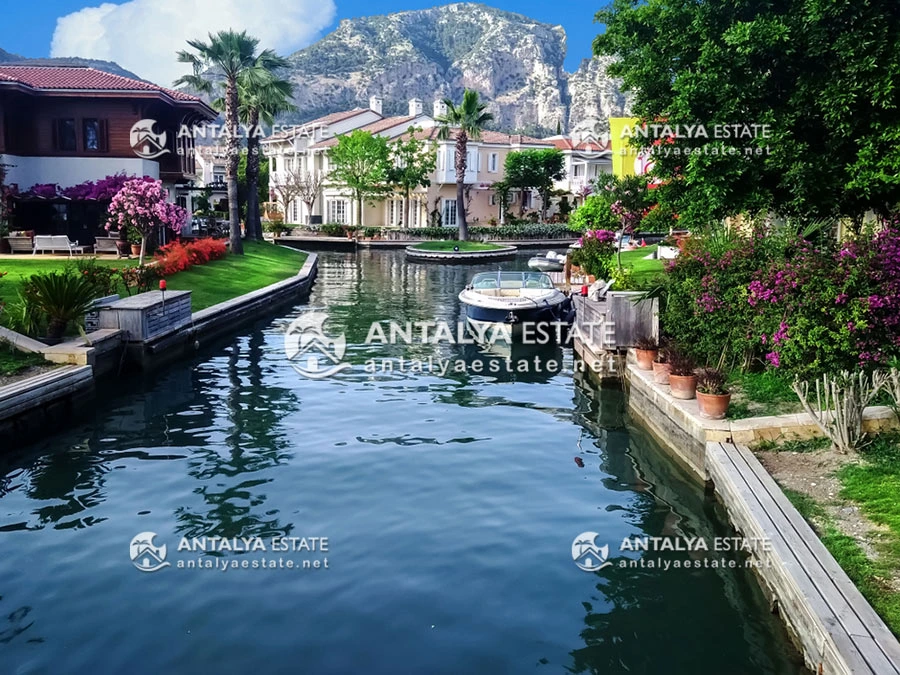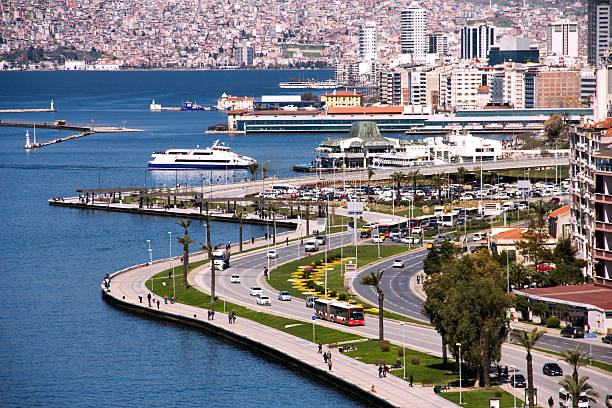
Are you a UK resident looking to invest in property abroad? Look no further than Turkey! With its stunning coastlines, vibrant cities, and rich history, Turkey offers a wealth of opportunities for those interested in buying property overseas. From bustling Istanbul to the idyllic beaches of Antalya, there is something for everyone.
But why choose Turkey? For starters, the cost of living is significantly lower than in the UK, meaning you can get more bang for your buck. Additionally, the Turkish government has implemented several initiatives to attract foreign investors, making the buying process smooth and hassle-free. From obtaining residency permits to mortgage options specifically tailored for foreigners, Turkey has made it easier than ever to own a piece of this beautiful country.
Whether you're looking for a holiday home or an investment property, buying property in Turkey from the UK offers a myriad of benefits. So, why wait? Take the leap and explore the opportunities waiting for you in the Turkish real estate market.

Property Market Overview in Turkey
The property market in Turkey has experienced significant growth over the past decade, attracting both domestic and international buyers. This growth can be attributed to several factors, including a strong economy, favorable government policies, and a booming tourism industry.
One of the key drivers of the property market in Turkey is its strong economy. Turkey has experienced steady economic growth over the years, with a growing middle class and increasing disposable income. This has fueled demand for housing, both from local buyers and foreign investors.
Another factor contributing to the growth of the property market in Turkey is the government's focus on attracting foreign investment. The Turkish government has implemented several initiatives to encourage foreign buyers, such as the Citizenship by Investment Program mentioned earlier. These initiatives have helped to boost the property market and attract a steady stream of international buyers.
In addition to a strong economy and government initiatives, Turkey's booming tourism industry has also played a significant role in driving the property market. With its stunning coastlines, historical sites, and vibrant cities, Turkey has become a popular tourist destination. This has created a high demand for rental properties, particularly in popular tourist destinations such as Istanbul, Antalya, and Bodrum.
Overall, the property market in Turkey is thriving, thanks to a strong economy, favorable government policies, and a booming tourism industry. Whether you're looking to invest in a holiday home, a rental property, or a long-term investment, Turkey offers a wealth of opportunities for buyers.

Legal and Financial Considerations for UK Buyers
When buying property in Turkey, UK buyers need to be aware of the legal and financial considerations involved. While the process of purchasing property in Turkey has become much easier for foreign investors, it is still important to understand the legal requirements and financial implications.
In terms of financial considerations, UK buyers should be aware of the costs involved in purchasing property in Turkey. These costs include property taxes, legal fees, and agent fees. It is important to factor in these costs when determining your budget and affordability.
Another financial consideration is the exchange rate between the British pound and the Turkish lira. As a UK buyer, you will need to convert your pounds into lira to make the purchase. Fluctuations in the exchange rate can impact the overall cost of the property. It is advisable to monitor the exchange rate and consider using a reputable currency exchange provider to get the best rates.
Additionally, UK buyers should be aware of any financing options available for purchasing property in Turkey. While it is possible to obtain a mortgage from a Turkish bank as a foreigner, the terms and conditions may vary. It is important to research and understand the financing options available to you and consult with a financial advisor if needed.
In summary, UK buyers need to be aware of the legal and financial considerations when buying property in Turkey. understanding the costs involved, monitoring the exchange rate, and exploring financing options are all crucial steps to ensure a successful and financially sound purchase.

Popular Locations for UK Buyers in Turkey
When it comes to buying property in Turkey, there are several popular locations that UK buyers tend to favor. These locations offer a unique blend of natural beauty, cultural heritage, and modern amenities, making them ideal for both holiday homes and investment properties.
One of the most popular destinations for UK buyers in Turkey is Istanbul. As the country's largest city, Istanbul offers a vibrant blend of East and West, with its rich history, stunning architecture, and bustling markets. The city is a melting pot of cultures and offers a range of properties to suit every budget and preference.
For those looking for a beachfront property, Antalya is a top choice. Located on the Mediterranean coast, Antalya boasts stunning beaches, crystal-clear waters, and a mild climate. The city offers a range of property options, from luxury villas to modern apartments, all within close proximity to the beach.
Bodrum is another popular location for UK buyers in Turkey. Known for its picturesque coastline, vibrant nightlife, and historical sites, Bodrum has long been a favorite among international buyers. The city offers a range of property options, including waterfront villas and charming townhouses.
Other popular locations for UK buyers in Turkey include Fethiye, Alanya, and Kalkan. These destinations offer a laid-back lifestyle, beautiful landscapes, and a range of property options to suit different budgets and preferences.
When choosing a location in Turkey, it is important to consider factors such as accessibility, amenities, and rental potential. Researching the different locations, visiting them in person if possible, and consulting with local real estate agents can help you make an informed decision and find the perfect property in your preferred location.

How to Find and Choose the Right Property in Turkey
Finding and choosing the right property in Turkey can be an exciting but daunting task. With so many options available, it's important to approach the process with careful consideration and research. Here are some tips to help you find and choose the right property in Turkey.
- Determine your budget: Before you start your property search, it's important to determine your budget. Consider how much you can afford to spend on the property, taking into account additional costs such as taxes, fees, and renovations if needed. This will help narrow down your options and ensure that you're looking at properties within your price range.
- Research different locations: Turkey offers a diverse range of locations, each with its own unique character and appeal. Research different locations to find the one that aligns with your lifestyle and preferences. Consider factors such as proximity to amenities, accessibility, rental potential, and future development plans.
- Consult with local real estate agents: Working with a local real estate agent can be invaluable when buying property in Turkey. They have in-depth knowledge of the local market, access to a wide range of properties, and can guide you through the buying process. Consult with multiple agents to get a broader perspective and choose the one that understands your needs.
- Visit the properties in person: If possible, visit the properties you're interested in before making a decision. This will give you a better sense of the property, its surroundings, and any potential issues that may not be apparent from the listing photos. If visiting in person is not feasible, consider virtual tours or video calls with the real estate agent to get a better idea of the property.
- Consider rental potential: If you're buying the property as an investment, consider its rental potential. Research the local rental market, occupancy rates, and average rental prices in the area. This will help you determine whether the property can generate income when you're not using it.
- Conduct due diligence: Before making an offer, conduct due diligence on the property. This may involve obtaining a survey, checking the property's title deed, and verifying any additional legal requirements. Working with a reputable lawyer is crucial during this stage to ensure that all legal aspects are properly addressed.
By following these tips and taking the time to research and consider your options, you can find and choose the right property in Turkey that meets your needs and preferences.

The Buying Process and Legal Requirements in Turkey
The buying process and legal requirements in Turkey may differ from those in the UK. It is important for UK buyers to understand the steps involved and ensure that all legal requirements are met to complete a successful property purchase.
- Offer and acceptance: Once you have found a property that you're interested in, you can make an offer to the seller. If the seller accepts your offer, a sales agreement will be drafted, outlining the terms and conditions of the purchase. It is important to have a lawyer review the sales agreement to ensure that your interests are protected.
- Property checks and due diligence: Before proceeding with the purchase, it is important to conduct checks and due diligence on the property. This may involve obtaining a survey, checking the property's title deed, and verifying any additional legal requirements. Your lawyer will guide you through this process and ensure that all necessary checks are completed.
- Obtaining a tax number: As a foreign buyer, you will need to obtain a tax number from the local tax office in Turkey. This number is required for various transactions related to the property purchase, such as opening a bank account and transferring funds.
- Applying for a residency permit: If you plan to spend extended periods of time in Turkey, you may need to apply for a residency permit. The requirements and process for obtaining a residency permit may vary, so it is important to consult with your lawyer or the local authorities for up-to-date information.
- Completing the purchase: Once all checks and due diligence have been completed, and all legal requirements have been met, you can proceed with the purchase. This typically involves signing the sales agreement, paying the agreed-upon deposit, and transferring the remaining funds to the seller. Your lawyer will oversee the completion process and ensure that all necessary paperwork is in order.
- Registering the property: After the purchase is completed, it is important to register the property in your name. This involves transferring the title deed, or Tapu, to your name. Your lawyer can assist with this process and ensure that the necessary paperwork is submitted to the relevant authorities.
It is important to note that the buying process and legal requirements may vary depending on the specific circumstances and location of the property. Working with a reputable lawyer who specializes in Turkish property law is crucial to ensure a smooth and legally compliant purchase.
Financing Options for UK Buyers Purchasing Property in Turkey
UK buyers purchasing property in Turkey have several financing options available to them. While it is possible to obtain a mortgage from a Turkish bank as a foreigner, the terms and conditions may vary. Here are some financing options to consider when purchasing property in Turkey.
- Mortgage from a Turkish bank: Some Turkish banks offer mortgages to foreign buyers, although the terms and conditions may be different from those offered to Turkish residents. The maximum loan-to-value ratio, interest rates, and repayment terms may vary, depending on the bank and the specific circumstances. It is important to research and compare different mortgage options to find the one that best suits your needs.
- Mortgage from a UK lender: Another option for UK buyers is to obtain a mortgage from a UK lender. Some UK banks and financial institutions offer mortgages specifically for purchasing property abroad. This option may be more familiar and easier to navigate for UK buyers, as the terms and conditions may be more aligned with their expectations.
- Self-financing: If you have the means to do so, self-financing the purchase is another option to consider. This involves using your own funds or savings to purchase the property outright, without the need for a mortgage or financing from a bank. Self-financing may offer more flexibility and fewer obligations compared to taking on a mortgage.
- Developer financing: In some cases, developers may offer financing options for buyers. This may involve paying a certain percentage of the purchase price upfront and spreading the remaining payments over a specified period. It is important to carefully review and understand the terms and conditions of the developer financing before committing to it.
When considering financing options, it is important to carefully review the terms and conditions, interest rates, repayment terms, and any additional fees or charges. Consulting with a financial advisor and comparing different options can help you make an informed decision and choose the financing option that best suits your needs and financial situation.

Taxes and Fees Associated with Buying Property in Turkey
When buying property in Turkey, UK buyers should be aware of the taxes and fees associated with the purchase. These costs can vary depending on the location, type, and value of the property. Here are some of the taxes and fees you may encounter when buying property in Turkey.
Property transfer tax: The property transfer tax, also known as the title deed fee or Tapu fee, is a tax imposed on the transfer of property ownership. The transfer tax rate is currently set at 4% of the declared value of the property. This tax is typically split equally between the buyer and the seller, although the specific arrangements may vary.
VAT (Value Added Tax): VAT is applicable to the sale of newly constructed properties. The VAT rate is currently set at 1% for residential properties and 18% for commercial properties. It is important to note that VAT is not applicable to the sale of resale properties.
Stamp duty: Stamp duty is a tax imposed on certain legal documents, including the sales agreement and the title deed transfer. The stamp duty rate is currently set at 0.189% of the declared value of the property. This tax is typically split equally between the buyer and the seller.
Agent fees: If you choose to work with a real estate agent, their fees are another cost to consider. Agent fees in Turkey typically range from 2% to 3% of the property's purchase price. It is important to clarify the agent's fees and any additional services they may offer before signing any agreements.
Property maintenance fees: If you are buying a property in a residential complex or a building with shared amenities, there may be ongoing maintenance fees. These fees cover the cost of maintaining common areas, facilities, and services such as security, landscaping, and repairs. It is important to inquire about the maintenance fees and factor them into your budget.
Utilities and insurance: When purchasing a property in Turkey, you will also need to budget for utilities and insurance. Utility costs include electricity, water, and gas, while insurance covers property and contents insurance. It is advisable to research and compare different insurance providers to find the best coverage for your property.
In summary, when buying property in Turkey, UK buyers should be aware of the various taxes and fees involved. Understanding these costs and factoring them into your budget will help you make an informed decision and ensure a smooth and financially sound purchase.